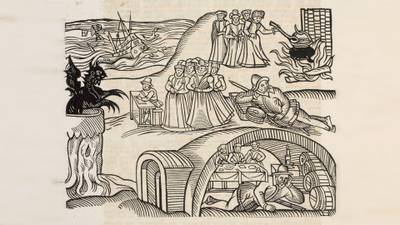
This course runs every other year. Its next run will be in January 2026.
Browse related online courses and degreesJoin our online short course in Scottish Enlightenment philosophy.
Through the mid-18th and early-19th centuries, Scotland was ablaze with fresh and challenging intellectual thought, publications, and scientific breakthroughs.
Philosophy was at the heart of this movement known as the Scottish Enlightenment.
Explore this extraordinary stretch of Scottish history through the philosophical works that inspired the movement and fired up debate across Scotland, Europe, and the world.
In this course, you’ll:
- study the groundbreaking ideas of pioneering Scottish Enlightenment intellectuals and philosophers
- focus on four hugely important thinkers in particular: Francis Hutcheson, David Hume, Thomas Reid, and Adam Smith, and
- be guided through their works by academics from our departments of History and Philosophy.
Who can join this online Scottish Enlightenment course?
This distance-learning course is for anyone, anywhere in the world, with a professional or personal interest in the Scottish Enlightenment, its philosophers, and its lasting impact.

Build credits towards a Masters degree
This online course is part of:
You can use the credits you earn on this short course towards this MLitt qualification.
What you’ll study
You’ll study the philosophical writings of Scotland’s prominent Enlightenment thinkers.
In the 18th century, Aberdeen was a hotbed of Enlightenment debate. We’ll draw on the University’s archives and wealth of academic expertise in this area to give you a wider context within which to understand this work.
You’ll explore:
- the contexts within which this work arose
- the significant influence it had on the European Enlightenment and beyond
- the treatment of epistemology, morality, political economy, language, religion, race, education, and the science of mind
- what we can learn from these thinkers today as we face our own intellectual, social and political challenges.
You’ll study the following modules:
- Father of the Scottish Enlightenment: Francis Hutcheson on Scottish moral philosophy
- Scotland’s Great Infidel: David Hume on knowledge and morality
- Infamous Scottish judge Henry Home (Lord Kames) on voluntary versus necessary causes in moral and natural worlds
- Adam Smith’s Theory of Moral Sentiments in Scottish ‘polite’ culture
- Father of Modern Economics: Adam Smith on political economy
- Conjectural history in the thought of Adam Ferguson and John Millar
- Thomas Reid in the Scottish School of Common Sense Philosophy
- Philosophy of rhetoric and language in the works of George Campbell and James Dunbar
- Scotian Plato: Dugald Stewart on moral education
By the end of this course, you’ll be able to…
-
Summarise the work of four key figures of the Scottish Enlightenment.
-
Discuss a diverse range of defining philosophical interests in the Scottish Enlightenment.
-
Draw on History, English Literature, and Philosophy to place works of the Scottish Enlightenment in their social, political and intellectual contexts.
-
Reflect on the insights of the Scottish Enlightenment, and how they might help us deal with some of the moral, social and intellectual challenges we face today.
-
Engage in intellectual debate and constructive criticism through written presentations, interactive discussions, and private study.
-
Display a critical and comparative appreciation of key arguments and debates in Scottish Enlightenment philosophy.
-
Evaluate primary and secondary sources.
Why study the Scottish Enlightenment online with the University of Aberdeen?

1st in Scotland for History
Our History Department is rated 1st in Scotland and 8th in the UK for teaching satisfaction in the Guardian University Guide 2024.

Top 20 in the UK for History
We’re rated top 20 in the UK for History in The Times and Sunday Times Good University Guide 2024.

Over 525 years of excellence
Study with the fifth-oldest university in the English-speaking world, founded in 1495.
How you’ll study
Online learning
This distance learning Scottish Enlightenment course is delivered flexibly, 100% online.
You can learn with us anywhere, no student visa required, and manage your study hours to suit you.
Your teaching
This course is taught at Masters level.
Teaching is delivered through MyAberdeen, our online Virtual Learning Environment (VLE). It holds all the materials, tools and support you’ll need in your studies. Take a look around MyAberdeen.
You can access your learning materials on computer, smartphone and laptop, 24 hours a day. You’ll find a range of online resources available, including:
- videos
- audio clips
- reading materials
- discussion boards with your tutors and peers
- online access to our award-winning Sir Duncan Rice Library.
Your tutors
This course is delivered by the School of Divinity, History, Philosophy and Art History.
You’ll learn from academics in our departments of Philosophy and History.
You’ll be assessed entirely online throughout your course via:
- your posts in discussion boards, and
- academic essays.
This course totals approximately 300 hours of study and assessment time.
That’s around 15 – 20 hours per week in regular topic work and independent study, with more time required around assessments.
This is an indicative guide to the time required for a typical student at this level to achieve the learning outcomes. This includes time for independent study, as well as teaching and assessments.
You can largely set your own study hours to cover the materials. MyAberdeen is available 24/7, so you can log in and study when it suits you.
Activities at fixed times
There may be some activities scheduled at fixed times, such as online meetings with your tutor or assessments with deadlines. But otherwise, you can access and work through the course at your convenience.
Our first-class support structure will ensure that you aren’t alone in your studies. You’ll have contact with your coordinator via email, MyAberdeen and Microsoft Teams. You can use social media and discussion boards to chat with your fellow students too.
We provide a wide range of services to support you in your studies and beyond:
- Careers and Employability Service
- Disability support
- IT support
- Library support
- Student Support Service – help with finances, stress, wellbeing and non-academic issues
- Student Learning Service – study support, with advice sessions available via phone or Skype
- Aberdeen University Students’ Association (AUSA) – run by students for students
- Toolkit – clever apps and free training that can make your study life easier
Wherever you are in the world, you’ll feel part of our very special Aberdeen learning community.
Your course coordinator
Dr Bradford Bow
Bradford is a Senior Lecturer in our Department of History. He is an intellectual historian of America, Scotland and Britain during the 18th century, with a broader interest in the global contexts of Enlightenment intellectual and moral culture.
View Bradford’s profileWhere this will take you
Towards a Masters degree
You’ll earn 30 credits at Masters level (SCQF Level 11) with this course. You can use these credits towards our online:

Masters in Scottish Heritage
Explore the rich history, art and philosophy of Scotland and its people. Access rare archive treasures and award-winning online teaching, with this flexible online Masters.
View MLitt Scottish HeritageBuild your learning
Continue to develop your knowledge of Scottish history, and build further Masters-level credits, with our growing range of online short courses:
- Approaches to Research: Archives and Sources
- Jacobite Scotland: Cultures, Identities, Legacies 1688-1830
- Pandemics and Plagues: History’s Deadliest Diseases
- Scotland: A Millennium of History
- Scottish Church History: From Columba to Graham
- Scottish Visual History
- Scottish Witch-Hunting and the Rise of a Protestant Culture 1590-1690
- The Scottish Diaspora
Careers
This course offers career-enhancing skills applicable in a range of professions, including teaching, tourism, and museum work.
You’ll gain transferrable skills in debate and constructive criticism through written presentations, interactive discussions, and private study.
Continuing professional development (CPD)
Your employer or professional institute may recognise this course for CPD hours. Talk to your employer or institute to find out more.

Free career support
Access our free careers service while you study.
- 1:1 appointments
- CV checks
- Interview prep
- Job opportunities
Entry requirements
Entry requirements
We welcome students from all over the world.
This course has no formal entry requirements. You do not need to provide proof of your qualifications.
But you do need to check the entry guidance above to understand the level of teaching delivered, to decide if this course is right for you.
If you do not have qualifications from the UK, check the equivalent teaching level for your country.
Visa requirements
You do not need a student visa to study online with us.
English language requirements
Teaching is delivered in English.
You do not have to provide proof of your English language skills to join this course. But we want to make sure that you can use English well enough to study successfully.
Recommended level of English
This course uses our Postgraduate Higher level of English language proficiency.
These are our Postgraduate Higher requirements, and these are minimum scores.
IELTS Academic, IELTS UKVI Academic, and IELTS Online (not IELTS Indicator or IELTS General Training)
- 6.5 overall
- 5.5 for listening and speaking
- 6.0 for reading and writing
TOEFL iBT and TOEFL iBT Home Edition
- 90 overall
- 17 for listening
- 21 for reading
- 20 for speaking
- 21 for writing
- TOEFL DI code is 0818
Cambridge English: B2 First, C1 Advanced, or C2 Proficiency
- 176 overall
- 162 for listening and speaking
- 169 for reading and writing
LanguageCert Academic/LanguageCert Academic SELT
- 70 overall
- 60 for listening and speaking
- 65 for reading and writing
LanguageCert International ESOL B2 Communicator (Written and Spoken) – Online / In-centre
- Overall High Pass
- 33 for listening, reading and speaking
- 38 for writing
Oxford ELLT Digital – English Language Level Test Online
- 7.0 overall
- 5.0 for listening and speaking
- 6.0 for reading and writing
PTE Academic (online test not accepted)
- 62 overall
- 59 for listening, reading, speaking and writing
Duolingo – tests taken from 1 July 2024 onward
- 120 overall
- 95 for listening and speaking
- 105 for reading and writing
University of Aberdeen English Pre-sessional Programme (PSE)
- Pass
- Valid for one year. Refresher can be offered if out of date
Pre-sessional academic English preparation programmes undertaken at other UK universities
- Pass at an equivalent of 6.5 (C1)
- B2 in all four skills
- Certification must be within one year prior to the start of your course
For more information about language qualifications see our English Language Requirements page.
You will need access to:
A computer (PC, laptop or Mac) operating on either:
- Windows 10 or later
- macOS 10.15 (Catalina) or later.
Most teaching materials are smartphone- and tablet-friendly. But we recommend a proper laptop or desktop for completing assignments comfortably.
Reliable internet access
We recommend:
- a wired connection
- a minimum download speed of 2 Mbps so you can take part fully in live sessions.
Speakers or headphones
- We recommend a headset with built-in microphone and earphones if you’re likely to study in an environment with background noise.
- A webcam is optional, but you may like to use one for some interactive sessions.
Software
We’ll give you access to Office365 applications. This means you can use online versions of Microsoft Word, Excel, and PowerPoint and install these programs on up to five personal devices.
If your course requires specialist software, we’ll provide you with access to this and a licence that lasts throughout your studies.
See our detailed IT requirements for more information.
When you study with us, you can expect a first-class support structure so that you’re never alone in your studies.
But learning online does mean you have to motivate yourself and manage your own time.
Your most important commitment will be time – the time to work through, reflect on and understand your teaching materials.
Before you start a course that involves a high degree of independent study, we recommend looking at the time you will be able to devote to your studies each week:
- Be realistic
- Create a weekly schedule as a guide
If you have any questions about studying online, get in touch with our friendly team. We’re here to help.
Fee payment
Your course fee needs to be paid in full before you start your course.
We accept payment via Visa Debit, Visa Credit and Mastercard.
Ways to save
You may be able to get help funding this course via:
- discounts – if any discounts are available for this course, they’ll appear in the section below
- employer sponsorship – we accept full and partial fee payments from sponsors.
Find out more about funding options.
Student card
All our students are entitled to a University of Aberdeen student card. This gives you access to a range of student discounts around the city and online.
This course has no formal entry requirements. You decide if it’s suitable for you.
The course is delivered at Masters level. At this level, you’d usually have at least:
- a 2:2 UK undergraduate degree (or equivalent), or
- relevant experience that supports this level of study.





















